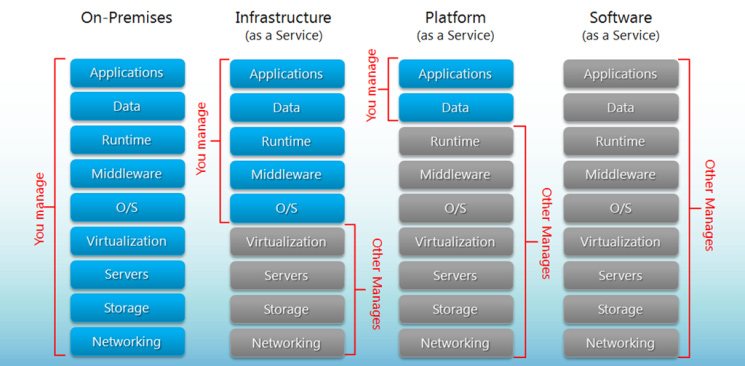Choosing the right web host is one of the most important decisions for tech startups. While comparing prices and hardware configurations is a good start, it’s equally important to look at infrastructure and support services when evaluating hosting companies. You must also decide between using a dedicated server, virtual private servers (VPS), or platform-as-a-service (PaaS) hosting providers, which each have their benefits and drawbacks.
In this post, we will take a look at these differences and discuss how to decide which option is right for your startup.

Dedicated Servers
Dedicated servers are the most straightforward option: There is a server sitting on a rack (on-site or at a data center) that belongs exclusively to you. You have the rights to all of the resources on the server and you can fully customize the hosting environment to your needs. You can let a poorly written SQL script run for ages and nobody is going to come banging on your door to shut it down to preserve CPU or memory resources.
In the past, most startups avoided dedicated servers since they required a lot of technical expertise to configure. The rise of Docker has made dedicated servers a bit easier to configure from the onset but it’s still a relatively hands-on process. You must also be prepared to deal with any issues that arise during odd hours and be comfortable troubleshooting server-related issues. We try to mitigate these downsides with 24x7x365 support and strong SLAs.
Perfect for…
Cheap dedicated servers are ideal for startups that need to be able to run custom software and have the resources to handle server-side setup and troubleshooting.
Benefits
- WYSIWYG – Dedicated servers are very predictable since you know exactly what you’re getting and there’s no ambiguity surrounding server resources.
- Customizable – Dedicated servers can be highly customized in almost any way imaginable, which may be necessary for some companies with custom software.
Drawbacks
- Price – Dedicated servers are often the most expensive option, especially when you factor in the potential need for experienced DevOps personnel.
- Complexity – Dedicated servers are a lot more complex to maintain than other hosting options since they often require a lot of configuration.
Virtual Private Servers
Virtual private servers, or VPS for short, are isolated virtual environments that work exactly the same as a dedicated server without the high cost and management overhead associated with a physical machine. These hosting providers take a larger server and create multiple virtual machines using the same hardware, which makes it a compromise between the unreliability of shared hosting and the high cost of dedicated hosting providers.
VPS are virtual environments that work the same as a dedicated server without the high cost and overhead. Click To TweetUnlike shared web hosts, VPS providers guarantee CPU power and memory availability rather than just bandwidth and storage. They also offer burst resources that may be available whenever the server load permits, as well as the ability to scale resources as needed. They are a lot more affordable than most dedicated servers and you don’t have to worry about maintaining the hardware component of the systems.
At EuroVPS, we try to mitigate the complexity of VPS (relative to shared hosting or PaaS) by offering unlimited support along with complementary cPanel WHM or Plesk licenses. We also offer a 100% uptime SLA with automatic daily backups and 24x7x365 support coverage.
Perfect for…
VPS providers are ideal for startups looking for the perfect middle ground between dedicated servers and shared web hosting, and don’t require a lot of custom software.
Benefits
- Lower Cost – VPS providers are cheaper than dedicated servers both in terms of price and the resources required to setup and maintain them.
- Flexibility – VPS providers offer a greater level of flexibility than shared hosts and many PaaS solutions without having to worry about the hardware.
Drawbacks
- Limitations – VPS providers may not be able to run all of the custom software that dedicated hosts are capable of running if the virtual environments are locked down.
- Resource Limits – VPS providers may limit the resources that you can use on a given server since it may adversely impact other users.
Platform-as-a-Service
Platform-as-a-Service (PaaS) solutions provide developers with a pre-built framework that they can use to deploy applications. For example, Heroku offers a command line interface (CLI) that makes it easy for developers to spin up a custom environment – such as a Linux environment with Postgres and Ruby installed for Ruby on Rails applications – and deploy their applications in a single line of code – such as `git push heroku master`.
The trade-off is that PaaS solutions are less customizable than dedicated servers or VPS, and can be a lot more expensive to scale. In other cases, PaaS solutions may be cost-effective at scale but can be difficult to set up and may try to lock you in to certain services. For example, Amazon’s Web Services (AWS) architecture can be intimidating to setup, while locking you into proprietary database or notification technology platforms. The cost of cloud services grow based on your workloads and it’s necessary to keep in mind to implement AWS cost optimization best practices to get the most value for every dollar that you pay.

Source: HostingAdvice.com
Perfect for…
PaaS solutions are ideal for startups working on a minimum viable product (MVP) or proof-of-concept since they require no configuration and can be quickly deployed.
Benefits
- Easy – PaaS solutions are often easier to use since they require virtually no configuration and can be deployed with only a few short commands.
- Scalable – PaaS solutions are easy to scale since they are typically virtual environments setup across multiple servers (similar to our Managed Clusters)
Drawbacks
- Price – PaaS solutions tend to be a lot costlier to scale than dedicated servers or VPSs with more complex pricing based on CPU usage or hours.
- Flexibility – PaaS solutions are designed to be out-of-the-box solutions, so they are a lot less customizable than dedicated servers or VPS providers.
The Bottom Line
Startups have a lot of options for hosting and the decision can be complex. By understanding the differences between dedicated servers, VPS providers, and PaaS solutions, you can at least make a more informed decision when it comes to the type of hosting provider you need. The next step is reviewing options in the area that you select before coming up with a final choice and migrating your application onto that account.
If you’re interested in VPS hosting, EuroVPS offers a startup program designed to help you get started on the right foot with a 50 percent discount on managed hosting for two years and one-on-one mentoring from our Chief Technology Officer. Apply Now.




